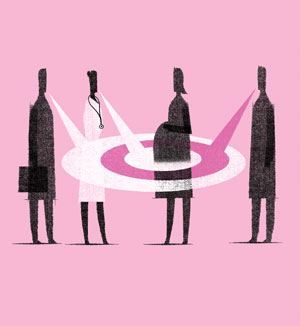Doctors, lawyers and others are collaborating to ensure pregnant women get workplace accommodations

Illustration by Jim Frazier
Medical professionals may mean well. But according to Liz Morris of the University of California’s Hastings College of the Law in San Francisco, a lot depends on the wording of the note to the employer. And medical workers aren’t lawyers. “The problem is that health care professionals are typically not trained in how to write the notes in a [legally] effective way,” says Morris, deputy director of the law school’s Center for WorkLife Law. “We actually found that in some cases, the notes … had the unintended consequence of the pregnant woman being sent out on leave, losing her health insurance and, in some cases, even losing her job.”
That finding comes from the Center’s Working Group on Pregnancy Accommodation, a team of doctors, lawyers, scholars and others working to address the “remarkably prevalent and remarkably open” problem of discrimination against pregnant workers. According to Morris, the group found that doctors’ notes are sometimes vague about the accommodation or the condition, make recommendations that aren’t medically necessary, or restrict activity that’s essential to the worker’s job duties.
Based on such a note, the employer could decide it can’t accommodate the worker at all. If the worker isn’t fired outright, she could be sent on leave too early and run out of leave before she can return. Early leave is also a financial catastrophe for workers who don’t get paid leave (61 percent, according to a 2014 report from the White House Council of Economic Advisers) or don’t have access to health insurance on leave.
That’s why the center is launching a website this fall with resources designed to help medical professionals create “legally appropriate” work notes. Pregnant@Work will offer a fillable form for professionals to use as a guide, as well as note-writing guidelines and templates for every state, because state laws vary. There will also be guidelines for lawyers on both sides of the labor bar.
“We think that everyone benefits when health care professionals have these tools,” Morris says.
This article originally appeared in the November 2015 issue of the ABA Journal with this headline: “First, Do No Harm: Doctors, lawyers and others are collaborating to ensure pregnant women get workplace accommodations.”



